David Suzuki's Blog, page 54
October 1, 2015
National cap-and-trade system part of NDP plan
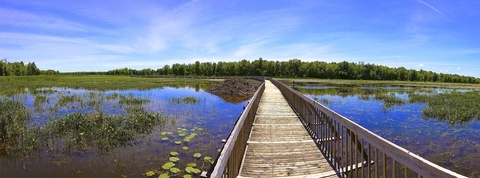
(Credit: Jamie McCaffrey via Flickr)
As energy and climate issues dominate environmental discussions this federal election, the New Democratic Party has released its plan for a national cap-and-trade system that sets emissions limits for polluters. The announcement came just ahead of a survey released by the David Suzuki Foundation in partnership with the Environics Institute for Survey Research that confirmed public support for domestic policies to tackle carbon emissions is on the rise in Canada.
The NDP plan would allow provinces to opt out of the national cap-and-trade system if their own carbon-pricing plans meet or exceed federal objectives. Carbon-pricing revenues would be returned to the provinces to be reinvested into efforts to reduce greenhouse gases. The market would determine the price on carbon. As well, NDP leader Tom Mulcair said his party would re-introduce the Climate Change Accountability Act to help track progress on long-term targets for reducing greenhouse gas emissions. With respect to emissions-reductions targets, the NDP tabled a private member's bill in June that set a target to reduce emissions 34 per cent below 1990 levels by 2025, and 80 per cent by 2050.
The David Suzuki Foundation -- along with many leading global organizations, including the World Bank, World Economic Forum, Intergovernmental Panel on Climate Change and Organization for Economic Cooperation and Development -- agrees that a price on carbon pollution through a carbon tax or regulatory cap-and-trade system is a critical part of any effective plan to address climate change.
Both a cap-and-trade system and a carbon tax can be effective if they are well-designed. Putting a price on carbon pollution through a carefully constructed approach is one of the most powerful government incentives to encourage companies and communities to pollute less by investing in cleaner technologies and/or by adopting more energy-efficient practices.
Evidence from around the world shows that these incentives work. A market-based cap-and-trade system was used to drastically reduce emissions that cause acid rain in North America in the 1980s and 1990s. When the B.C. government introduced its carbon tax in 2008, it set out a path to fight climate change while continuing to stimulate economic growth. From the tax's introduction to the end of 2012 (when the tax was frozen at $30 per tonne), B.C.'s consumption of fossil fuels covered by the carbon tax decreased by 19 per cent per capita compared to the rest of the country. At the same time, B.C.'s economy outperformed most of Canada.
According to the David Suzuki Foundation/Environics poll mentioned previously, support for the carbon tax among B.C. residents is at its highest level since the policy was introduced in 2008. Sixty-one per cent of residents say they either "strongly" or "somewhat" support the carbon tax. Outside of B.C., 58 per cent of Canadians are in favour of a B.C.-style carbon tax in their own province.
British Columbia, Alberta, Quebec and Ontario have already implemented (or are implementing) their own carbon tax or cap-and-trade systems. When Ontario's cap-and-trade regulations are finalized, and considered alongside B.C.'s carbon tax, Quebec's cap-and-trade and Alberta's large industrial emitters' regulations, more than 80 per cent of Canadians will live in provinces that price carbon pollution.
The NDP has also announced a plan to invest $1.3 billion each year over 20 years to support municipal transit-related needs as well as $200 million over four years to retrofit homes, making them more energy efficient. Finally, the NDP has pledged to create a green municipal fund of $150 million over four years available to cities and towns seeking to create cleaner transit systems and other projects aimed at sustainability.
Stay tuned as we expect other parts of the NDP's environmental platform to be announced shortly.
See our blogs on what other parties have committed to the environment:
YES, I'm voting on October 19.
Hey! Want more DSF? Join David Suzuki on Facebook

September 30, 2015
Crawlin' upstream: The Homegrown Park Crawl 2015
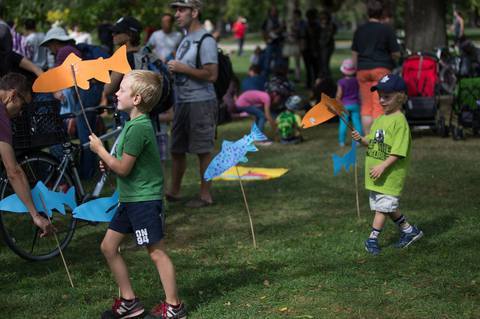
Inspired by salmon, we crawled upstream this year! (Photo by Easy Camera Art)
More than 1,000 residents came out to celebrate the green spaces along Toronto's former Garrison Creek in this volunteer-run event, part of the David Suzuki Foundation's Homegrown National Park Project, which aims to grow a butterfly-friendly corridor through the heart of Canada's largest city.
This year's event featured food from some of the city's top chefs and restaurants, including Pizzeria Libretto, FRANK Restaurant, Banjara Indian Cuisine and The County General. Between treat samplings, participants crawled upstream from park to park accompanied by four superb local musical acts: MIDNIGHT VESTA, Turbo Street Funk, Maracatu Mar Aberto and The Woodshed Orchestra!
We marched through four parks -- Trinity Bellwoods, Fred Hamilton, Bickford and Christie Pits -- with activities along the way, including butterfly crafts, love letters to Toronto's green spaces and an interactive dance performance.
Thanks to our amazing team of volunteers and community partners, plus these generous folks who provided fabulous food and drink:
Pizzeria Libretto, Banjara Indian Cuisine, Cookie Martinez, Two Bite Saloon, Chocosol, Harvest Kitchen, Jon's Pops, Coffee Pubs, Le Dolci, Tallboys, Wenona Craft Beer Lodge, My Crème Caramel, The County General, Treeline Catering, FRANK restaurant, The Vegan Duchess
This event would not be possible without the generous support of our event partners and sponsors: Gervais Party & Tent Rental, Impact Canopies, Southbrook Vineyards, Steam Whistle Brewery and Universe.
Stay up-to-date on all the Homegrown fun by joining our Homegrown National Park Project Facebook page.
Post by Homegrown National Park Project.
Hey! Want more DSF? Join David Suzuki on Facebook

September 29, 2015
Why the David Suzuki Foundation won't tell you who to vote for

Credit: Cristian V. via Flickr
At the David Suzuki Foundation, we strive to be an important voice on environmental issues and policies in Canada, and we know our community depends on us for information about ways to make a difference. We know, too, that federal elections are an important part of deciding the future of our country. And so, during this election, we are sharing our insights on significant issues through an environmental lens.
We've received many questions about parties and candidates. People in our community are asking, "Who should I vote for?" We thought we should tell you why we're not answering that question.
As a registered charity, we operate under Canada Revenue Agency guidelines that prohibit us from making partisan comments or showing preference for individual candidates or for one party's platform over another.
We can encourage you to vote (and we do), and we can share interesting and useful information about the party platforms and our own concerns (and we do). But we can't give you suggestions on which candidate or party you should vote for or provide any partisan commentary.
What can we do during the election?
We can discuss the Foundation's policy positions on issues we work on and believe are critical in this election, such as ocean conservation, energy and climate, endangered plants and animals and science and democracy.
We can factually report on where all parties stand on policies such as carbon pricing, climate change, oil tankers and transportation.
What can't we do during the election?
We can't align ourselves with particular parties, candidates or individual positions.
We can't weigh in on the format of leaders' debates.
We can't promote party platforms that align with our vision.
Given those constraints, this is what we are working on:
Election Pledge: A letter telling the party leaders that you are voting for a candidate who will protect the people and places you love.
Encouraging you to ask your candidates about their positions on important issues.
Providing a tool to help you write a letter to the editor of your local paper.
Keeping you informed in a non-partisan way with our Election 2015 blogs.
The results of the election will not only affect our work but will shape the lives of Canadians for generations to come. It's hard to imagine a more important reason to be involved.
Now... have you registered to vote?
Hey! Want more DSF? Join David Suzuki on Facebook

How to leave the leaves
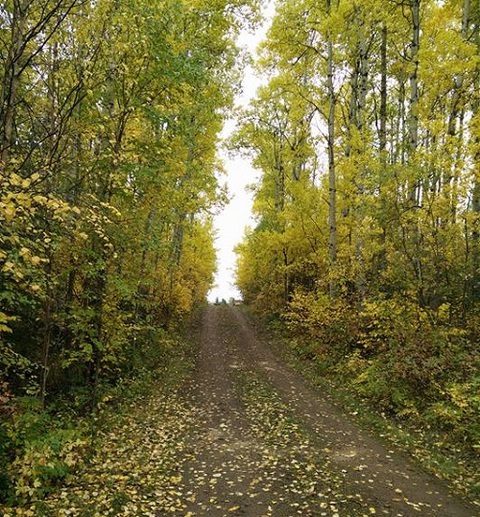
Those brown, dead leaves are the planet's butterfly nursery.
If I know you, you can't stop helping pollinators -- planting a butterfly garden, getting your yard off grass, signing the Monarch Manifesto and more. Well, you won't believe what I want you to do (or not do) now...
DO NOT rake your leaves! (Because butterflies begin in leaves, as larvae.)
Those brown, dead leaves are the planet's butterfly nursery. They're home to butterfly larvae, microbes and worms. And leaf litter is where many species of butterflies and moths overwinter as pupae. Animals like toads, shrews and salamanders benefit from leaf litter to hide and hunt, too.
This fall, let your rake collect only dust.
Can't leave all of your leaves where they fall? Here are a few other ideas:
Mulch leaves in your planter beds
Does your homeowner's association have something against leaves? Rake leaves off the lawn and into your planter beds.
Mulch leaves on your lawn
Use your mower to mulch leaves on the lawn and improve your lawn health by suppressing weeds and fertilizing the soil.
Collect browns to compost
Composting 101 tells us to balance "greens" with "browns." Store leaves in a bin and add them to your backyard composter throughout the winter months.
Craft with leaves
Have children collect their favourite leaves in your yard and throughout the neighbourhood and try your hand at nature weaving. Make a natural loom or craftiments.
Note: DO rake leaves out of sewers and drainage pathways.
Have you been able to break your leaf-raking habit?
Sincerely, Lindsay Coulter
A fellow Queen of Green
Hey! Want more DSF? Join David Suzuki on Facebook

September 28, 2015
Help get milkweed onto the shelf next spring!
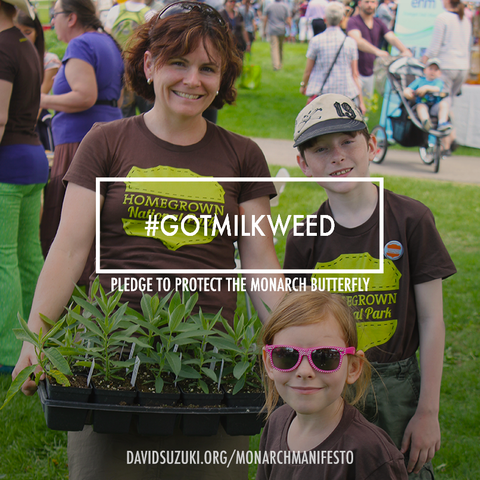
Talk to your local garden centres or nurseries!
As part of the Monarch Manifesto, the David Suzuki Foundation is encouraging Canadians to reach out to garden centres or nurseries across the country and ask them carry milkweed on their shelves.
Each store or nursery that agrees to carry milkweed will be added to the David Suzuki Foundation's list of local milkweed dealers across the country next spring.
To make this task easier, below is a sample letter you can adapt. Click here to download a word document version of the same letter.
For best results, try dropping by your local store in person.
Good luck! (We're behind you all the way.)
Tell us about your challenges and successes! Comment on Facebook tweet using the #monarchmanifesto hashtag or email contact@davidsuzuki.org.
Often all it takes to get things rolling is a little inspiration, some initiative and periodic, gentle nudges to make fun, green things happen in your neighbourhood.
Together, we can bring monarch butterflies back from the brink.
Sample letter below, please adapt
__________________________________
[Insert date]
[Insert your name, address, email and phone number]
[Insert institution name and address]
Re: Please help bring monarchs butterflies back from the brink
Dear [insert name],
Have you noticed there aren't as many monarch butterflies as there used to be? I remember seeing them in [insert community name] each summer. But monarch numbers have declined by 95 per cent over the past couple of decades due to loss of the habitat and milkweed plants they need to survive. The good news: You can help bring monarchs back!
I live in the neighbourhood and was wondering if [insert name of store] would be interested in helping monarchs and other butterflies by stocking native milkweed plants on your shelves next spring. If you are planning to carry milkweed, great! If not, please consider ordering milkweed and other butterfly-friendly native flowers and shrubs to sell next spring and summer.
As you likely know, milkweed is the only plant monarch moms use to lay their eggs, and it's the monarch caterpillars' main source of food. That's why the David Suzuki Foundation and many other groups are encouraging us all to plant more milkweed. And if your store carries milkweed, it will be added to the Foundation's growing online list of local milkweed suppliers next spring.
Thanks for your time. I hope to hear from you soon.
Sincerely,
[Insert your name]
P.S. If you have milkweed on your shelves next spring, you can count on me to help spread the word.
Hey! Want more DSF? Join David Suzuki on Facebook

Has your garden centre got milkweed?

Talk to your local garden centres or nurseries!
Help get milkweed onto the shelf next spring!
As part of the Monarch Manifesto, the David Suzuki Foundation is encouraging Canadians to reach out to garden centres or nurseries across the country and ask them carry milkweed on their shelves.
Each store or nursery that agrees to carry milkweed will be added to the David Suzuki Foundation's list of local milkweed dealers across the country next spring.
To make this task easier, we've created a letter for you to send. For best results, try dropping by your local store in person.
Good luck! (We're behind you all the way.)
Tell us about your challenges and successes! Comment on Facebook tweet using the #monarchmanifesto hashtag or email contact@davidsuzuki.org.
Often all it takes to get things rolling is a little inspiration, some initiative and periodic, gentle nudges to make fun, green things happen in your neighbourhood.
Together, we can bring monarch butterflies back from the brink.
Hey! Want more DSF? Join David Suzuki on Facebook

National survey reveals growing majority support for government action on climate change and renewable energy
VANCOUVER, September 18, 2015 - Support for an international agreement to cut fossil fuel emissions is growing in Canada, according to a poll released as Canadians prepare to vote on October 19 for the government that will represent them at the United Nations' climate change conference in Paris in December.
The survey, released today by the Environics Institute for Survey Research in partnership with the David Suzuki Foundation, shows that strong support for Canada's involvement in an international agreement outweighs strong opposition by a more than three-to-one margin. A growing majority of 61 per cent of Canadians say the government should cooperate with other nations to reduce carbon emissions and limit climate change, even if it results in some job losses and higher prices for some goods and services. Only 12 per cent of Canadians say they would be upset if the country were to sign on to such an agreement.
Public support for domestic policies to tackle carbon emissions is also on the rise. Approval of B.C.'s carbon tax, a shift to tax pollution and relieve tax on income, among residents of that province is at its highest level since the policy was introduced in 2008, with six in 10 saying they strongly (25 per cent) or somewhat (36 per cent) support it. Outside of B.C., 58 per cent of Canadians are in favour of a B.C.-style carbon tax in their own province. Support for this policy is weakest in Alberta, but even in that province supporters and opponents are equal in number (48 per cent favour versus 47 per cent oppose).
"These results show that even though climate change has been a secondary issue in this year's election campaign, there is growing public sentiment that concrete action to limit emissions from fossil fuels needs to happen," said Environics Institute executive director Keith Neuman. "Four in 10 Canadians feel strongly enough about Canada participating in an international agreement that they would be upset if it doesn't happen."
Canadians are also expressing growing confidence in the renewable energy sector, with three-quarters (74 per cent) saying they believe their province could shift most of its energy needs to clean, renewable sources such as wind, solar and biofuels. This is the majority sentiment across the country, most noticeably in British Columbia (82 per cent) and Quebec (81 per cent), with the most growth since 2013 in the western provinces.
"Canadians are clearly optimistic about the country's clean-energy future and the leadership role Canada can play internationally," said David Suzuki Foundation science and policy manager Ian Bruce. "But along with that optimism comes higher expectations for government action to limit carbon pollution. It will be interesting to see how these expectations play into the election."
As recorded on previous surveys, opinions about climate change differ across the political spectrum. Supporters of the main federal opposition parties demonstrate the strongest views about the seriousness of climate change and the need for actions such as signing an international climate agreement (favoured by 75 per cent of NDP, 72 per cent of Liberal Party and 70 per cent of Green Party supporters), compared with only 42 percent of Conservative Party supporters. This difference is much less than in the United States, where the polarization between Democrats and Republicans is much more severe.
The survey examined public opinion on climate change as part of the Environics Institute's ongoing Focus Canada public opinion research program, updating its annual surveys on climate change dating back to 2007. This year's survey is based on telephone interviews conducted with 2,004 Canadians between August 4 and 16, 2015. A sample of this size drawn from the population produces results accurate to within plus or minus 2.2 percentage points in 19 out of 20 samples.
To view the full report and survey data see: http://www.environicsinstitute.org/institute-projects/current-projects/focus-canada-2015-public-opinion-on-climate-change
For more information:
Environics Institute for Survey Research, Keith Neuman: 416-969-2457 or 416-272-6628
David Suzuki Foundation, Steve Kux: 604-374-4102
Hey! Want more DSF? Join David Suzuki on Facebook

September 24, 2015
It's time to talk about a new vision for the economy
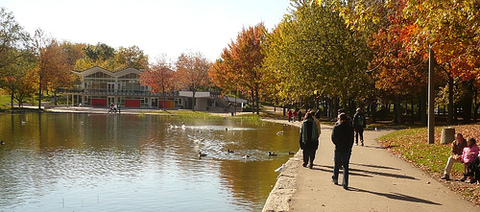
A cornerstone of our current economy, consuming goods, may give us fleeting pleasure, but it isn't making us happier. Studies show the pleasure derived from food, sex, exercise and time with loved ones or doing meaningful work takes much longer to fade. (Credit: Mikey G Ottawa via Flickr)
The federal leaders' debate on the economy focused on important issues -- jobs, deficits, infrastructure spending, pipelines, climate change -- but no one talked about a different vision for Canada's economy. What if we challenged our leaders to answer the dilemma posed by American journalist Charles Bowden: Imagine the problem is that we cannot imagine a future where we possess less but are more? Not being able to even imagine an economy without continual growth is a profound failure.
A better economic vision would support the right of all Canadians to live in a healthy environment, with access to clean air and water and healthy food. It would respect planetary boundaries and provide the moral imperative to decrease growing income disparities. Businesses would be required to pay for environmental damage they inflict, capital would be more widely distributed and ideas, such as employee shareholder programs with ethically invested stocks, would be the norm.
This alternative economy would connect people to family, friends and communities, focus on social capital investments over gross domestic product gains, and distribute wealth through taxes, social programs and minimum guaranteed incomes. In The Spirit Level: Why More Equal Societies Almost Always Do Better, authors Richard Wilkinson and Kate Pickett write that developed countries with the greatest inequalities have higher rates of disease, mental illness, drug use and a host of other social problems. Reducing income gaps makes all of us healthier.
In Canada, we don't question our emphasis on constant growth. Our economic system favours short-term profits at the expense of our long-term health and survival. Despite more than five decades of trying to fix our environmental challenges, forests are still threatened, deserts are spreading and climate change is creating more frequent and intense storms, floods, forest fires and droughts.
We're also left with income inequality that threatens our democracy. Since the 1980s, the top one per cent of Canadians has increasingly enjoyed the biggest share of income growth and the least pain during economic downturns. Since 2009, the top 10 per cent have seen half of all income growth. The bottom 50 per cent of Canadians have not only seen declines in income growth, accounting for just three per cent of income gains, they've also been hardest hit during recessions.
In a statement that applies equally to Canada, the late U.S. Supreme Court Justice Louis Brandeis once noted, "We can have democracy in this country or we can have great wealth concentrated in the hands of a few, but we cannot have both."
A cornerstone of our current economy, consuming goods, may give us fleeting pleasure, but it isn't making us happier. Studies show the pleasure derived from food, sex, exercise and time with loved ones or doing meaningful work takes much longer to fade. Worse, consuming stuff is not only addictive, it also feeds rivalry and societal overconsumption.
The Canadian Index of Wellbeing uncovered some troubling truths about the connection between the economy and well-being. When Canada's economy was thriving, Canadians saw only modest improvements in their overall quality of life, but when the economy faltered our well-being took a disproportionate step backward. This is troubling, given predictions for an upcoming extended period of weak economic growth. Why are we so reluctant to talk about how we can get out of this cycle of endless buying and unsatisfying consumption by considering steady-state economies or even de-growth alternatives?
Despite this failure to imagine a better way, we may finally be seeing a change in course. The climate crisis is creating a global consciousness shift, with hundreds of thousands marching to demand change, and Pope Francis's Encyclical warning that economic growth and technology can't continue to trump all other concerns. Throughout Europe, North America and beyond, support is growing for confronting income and wealth inequality.
Imagine a Canadian election in which leaders gave us economic visions aimed at caring for people and the planet. It's time we talked about a future when we can live with less and be happier.
I'll be joining Peter Victor, one of Canada's most respected ecological economists, to talk about these ideas at a public event for the Canadian Society for Ecological Economics conference in Vancouver on October 1. I hope to see some of you there.
Hey! Want more DSF? Join David Suzuki on Facebook
September 23, 2015
The millennial vote: problems and solutions

(Credit: Theresa Thompson via Flickr, modified)
If you're in your 20s, you've heard the reasons why voting is important: it's our democratic right, one vote does make a difference and less than 40 per cent of eligible voters under the age of 30 voted in the last election -- and that's shameful.
Now there's one more important thing we millennials need to know: how to vote when it's become more difficult.
I was a student during the last federal election, and voting was as easy as bringing a student ID to campus. Now, with the government's Fair Elections Act, passed in June, students can't do this. Voter Information Cards can no longer be used as proof of address. And with the October 19 election happening near the start of a school year, many students will not be able to prove their address in time to vote, which becomes a major problem when you consider there are more than two million post-secondary students in Canada.
This is why the Canadian Federation of Students and others sought an injunction against the Fair Elections Act a few months ago. Ontario Superior Court Justice David Stinson found that "there is a risk that some individuals who would otherwise rely on the Voter Information Card to enable them to vote will be unable to do so," but he refused to grant the injunction.
Even young people who are not students may now face voting roadblocks because of their age and where they're at in life.
For one, we're transient. I've lived in five different homes in two different provinces over the past two years, and I think I've only had proof of address for one (my family's home).
Similarly, we like to travel abroad. I'm not going to be in Canada on October 19, and I know a lot of people around my age who aren't going to be either.
Also, many of us don't have driver's licences, or our government-issued ID is stored safely somewhere else.
Voting is relatively new to us, and as we all know, new habits are difficult to form. Some call it apathy, but I think it's more than that.
We know about these difficulties because we're living with them, but that doesn't mean we can't vote. No matter how difficult the law or our lifestyles make it to vote, we still can.
What are some solutions?
.myTable { background-color:#eee;width:100%; }
.myTable th { background-color:#000;color:white;text-align:center; }
.myTable td, .myTable th { padding:5px;border:1px solid #000; }
.myTable th:first-child, .myTable td:first-child { width:30%;font-weight:bold; }
ul li { padding: 4px 0px; }
ProblemsSolutions
I am a student without proof of current residenceIf you live in an on-campus student residence, fill out this letter and have it signed by your residence admin. You will still need one other piece of ID to vote.
Check to see if there's an Elections Canada office on campus and vote there. Note that these are only open from October 5 to 8. They are not open on Election Day. You will vote for a candidate in the riding of your permanent residence, not the one you currently live in.
If you are registered at home and plan on going there for the Thanksgiving weekend, vote in advance polls. Maybe make it a family affair!
Find a neighbour who has proof of residence and have her or him take an oath for you on voting day. You will need two pieces that prove your identity.
I have moved and don't have proof of current residenceDouble-check the second list on this page and see if you can get one of those statements to prove residence (transfer the utility bill to your name, ask for a residential lease with your name on it, etc.).
Check to see if you are registered somewhere else, and if you are, apply to vote by mail. Ask whoever currently resides there to forward your ballot to where you are now.
Find a neighbour who has proof of residence and have him or her take an oath for you. You will still need two pieces that prove your identity.
I won't be in the country (or my residence) on voting dayApply to vote by mail. You will need access to a printer, and you will have to buy stamps, but it's worth it.
Check to see if you'll be home on advance voting days.
I don't have a government-issued IDTry to take the written driver's test! It's quick and you will receive a paper version of your ID as soon as you pass. Just because you have a licence doesn't mean you have to drive.
If your ID is stored with your parents or somewhere else, ask someone to mail it to you.
I am feeling over-whelmed/apatheticFind creative ways to get a group of friends involved with the election.
Research the parties and think about what matters to you. If you don't know where to start, Vote Compass is a great tool to find out where you stand.
And of course, our Election 2015 blog has quick analysis on key environmental issues and party information.
Voting may be difficult for a number of reasons, but don't let that stand in the way of voting.
Share any problems you want help with or other solutions you've found on social media with #elxn42.
Hey! Want more DSF? Join David Suzuki on Facebook

Toronto's tastiest musical parade crawls upstream this Sunday
Charity event brings parade of music, food and drink, art through four city parks
TORONTO, SEPTEMBER 23, 2014 -- Thousands of Torontonians are expected to join the David Suzuki Foundation's third annual Homegrown Park Crawl on Sunday, September 27, 2015. The free event will feature a parade led by adventurous musical acts through parks and residential streets along the former Garrison Creek in the city's downtown west end. At Christie Pits and Trinity Bellwoods parks there will be more music, plus food and drink from some of the city's top chefs, art and crafts from dozens of local artists and fun kids' eco-activities.
WHO: The David Suzuki Foundation's team of volunteer Homegrown Park Rangers, four bands, 20 food and drink vendors, dozens of local artists and community groups and #Gnomezuki. (See full list of musicians, food vendors, groups and performers below).
WHAT: The third annual Homegrown Park Crawl is a celebratory event that will bring participants through four city parks along Toronto's former Garrison Creek. Crawlers will sample food and drink from some of Toronto's best restaurants, enjoy kid-friendly activities and crafts and join in musical parades between each park. The event will raise funds for the David Suzuki Foundation's Homegrown National Park Project (www.davidsuzuki.org/homegrown), which aims to create a green, butterfly-friendly corridor through the city, one fun green intervention at a time.
WHERE: The event will begin at noon at Trinity Bellwoods Park, where there will be food vendors, local groups, art and butterfly craft activities and music from Midnight Vesta. At 2 p.m., local funk band Turbo Street Funk will lead participants from Bellwoods to Fred Hamilton Park, where there will be a brief musical dance performance. Brazilian samba troupe Maracatu Mar Aberto will lead participants through Bickford Park to Christie Pits. At 3 p.m., the parade will end at Christie Pits Park, where there will be food and drink vendors, a dozen community groups and the Christie Pits Art Crawl. Woodshed Orchestra will play while folks enjoy food, drink and art until 6p.m.
WHEN: Sunday, September 27, 2015, 10 a.m. - 6 p.m.
The event is free admission, rain or shine. Food tickets are available online until the event at www.davidsuzuki.org/parkcrawl. Limited food and drink tickets will be available onsite, cash only.
Food and drink vendors: Banjara Indian Cuisine, Chocosol, Cookie Martinez; CSI Coffee Pubs; FRANK restaurant; Harvest Kitchen; Jon's Pops; Le Dolci; My Crème Caramel; One Love Vegetarian; Pizzeria Libretto; Southbrook Vineyards; Steamwhistle Brewery; Tallboys; The County General; The Vegan Duchess; Treeline Catering; Two Bite Saloon; Wenona Craft Beer Lodge
Musical acts, performers & interventions: Midnight Vesta; Turbo Street Funk; Maracatu Mar Aberto; The Woodshed Orchestra; Julia Aplin Dance; Biozone (Centre for Applied Bioscience and Bioengineering); Love Lettering Project; ParkHive; Christie Pits Art Crawl
Community groups: David Suzuki Foundation; LEAF; Toronto Beekeeper's Co-op; Fresh City Farms; Toronto Master Gardeners; Friends of Roxton Road Parks; Toronto Green Community; Park People; Friends of Christie Pits Park; Beekeeper's Naturals; North American Native Plant Society
For further information, please visit www.davidsuzuki.org/parkcrawl or contact:
Jode Roberts, David Suzuki Foundation, 647-456-9752, jroberts@davidsuzuki.org, @joderoberts
Hey! Want more DSF? Join David Suzuki on Facebook
David Suzuki's Blog
- David Suzuki's profile
- 247 followers



